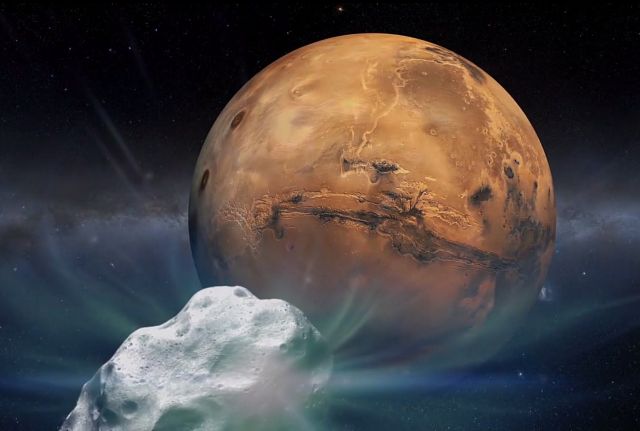Post by freediver on Jan 28th, 2009 at 5:16pm
http://www.newscientist.com/gallery/dn16408-rover-five-years/1
This month, NASA's twin Mars rovers are celebrating their fifth anniversary on the Red Planet, long outlasting the three months they were scheduled to survive (find out the three secrets to their success). This gallery highlights the rovers' biggest discoveries and most stunning images.
NASA's twin rovers, Spirit and Opportunity, blasted off Earth on 10 June and 7 July 2003 and landed on opposite sides of the Red Planet on 4 January and 25 January 2004, respectively. Their mission was initially scheduled to last three months. (Illustration: NASA/JPL-Caltech)
Almost immediately after landing in a region of Mars called Meridiani Planum, Opportunity made a watershed discovery: rocks at its landing site had formed in ancient acidic lakes. The evidence came from hematite - which almost always forms in water - in the form of tiny spherules called "blueberries" (pictured); distinctively curved lines of sediment that resulted from the gentle sweeping motion of a water current; and sulphate salts that may have been left behind when salty water evaporated (though other researchers have argued that volcanism or meteorite impacts could explain the sulphate sediments). (Image: NASA/JPL/Cornell/USGS)
Unlike its twin, Spirit did not immediately find evidence of water at its landing site in Gusev Crater. Orbital images had suggested the crater was once an ancient lake, but Spirit turned up little besides basaltic lava flows for its first six months on the planet (the lava may have buried evidence of any lake sediments once there). But the rover enjoyed a reversal of fortune when it reached the higher terrain of the Columbia hills, which are even older than the approximately 3 billion-year-old volcanic plains on Gusev's floor. It found intriguing sulphur-rich rocks that appear to have formed in the presence of water. The rock in this image, named Clovis, contains an iron-bearing mineral called goethite that can form only in water. (Image: NASA/JPL/Cornell)
In January 2005, Opportunity found an unusual, metallic-looking rock (pictured) near its discarded heat shield. It used onboard spectrometers to confirm that the rock was made of iron and nickel, showing that indeed it must be a meteorite that had fallen from the sky - the first meteorite ever found on another planet. In April 2006, Spirit followed suit, spotting two iron meteorites. Such metallic meteorites, which make up just a few percent of the space rocks expected to litter the Martian surface, are easier to identify based on their appearance and spectral properties than the more common "stony" meteorites. (Image: NASA/JPL/Cornell)
In March 2005, Spirit captured images of two dust devils - vortices that lift dust from the surface into the air - in one day (one can faintly be seen in this image). It was the first time any had been seen on Mars since the Mars Pathfinder mission in 1997. Around the same time, a separate dust devil apparently also swept the rover's solar panels clean of a year's accumulation of dust, restoring their power output to 93% of initial levels. (Image: NASA)
In April 2005, Opportunity got stuck as it was crossing a series of shallow, sandy ridges. It ultimately spent about five weeks trapped on a 30-centimetre-high ripple of soil nicknamed "Purgatory Dune" (shown here in this vertical projection woven together from images from its navigation camera). When it got stuck, its primary objective had been speed. It was cruising along at 200 metres a day and most of its software safeguards - which could have detected that its wheels were slipping - were turned off. That caused the rover to dig itself in more deeply than it would have otherwise. Mission members learned from the mishap, freeing the rover by driving it backwards and instituting periodic wheel 'slip checks'. In June 2006, those changes helped the rover quickly extricate itself from a sandy spot nicknamed "Jammerbugt", Danish for the "Bay of Lamentation". (Image: NASA/JPL)
On 19 May 2005, Spirit captured this spectacular view as the Sun sank below the rim of Gusev crater. This was voted the most popular image in a rover photo contest. (Image: NASA/JPL/Texas A and M/Cornell)
This month, NASA's twin Mars rovers are celebrating their fifth anniversary on the Red Planet, long outlasting the three months they were scheduled to survive (find out the three secrets to their success). This gallery highlights the rovers' biggest discoveries and most stunning images.
NASA's twin rovers, Spirit and Opportunity, blasted off Earth on 10 June and 7 July 2003 and landed on opposite sides of the Red Planet on 4 January and 25 January 2004, respectively. Their mission was initially scheduled to last three months. (Illustration: NASA/JPL-Caltech)
Almost immediately after landing in a region of Mars called Meridiani Planum, Opportunity made a watershed discovery: rocks at its landing site had formed in ancient acidic lakes. The evidence came from hematite - which almost always forms in water - in the form of tiny spherules called "blueberries" (pictured); distinctively curved lines of sediment that resulted from the gentle sweeping motion of a water current; and sulphate salts that may have been left behind when salty water evaporated (though other researchers have argued that volcanism or meteorite impacts could explain the sulphate sediments). (Image: NASA/JPL/Cornell/USGS)
Unlike its twin, Spirit did not immediately find evidence of water at its landing site in Gusev Crater. Orbital images had suggested the crater was once an ancient lake, but Spirit turned up little besides basaltic lava flows for its first six months on the planet (the lava may have buried evidence of any lake sediments once there). But the rover enjoyed a reversal of fortune when it reached the higher terrain of the Columbia hills, which are even older than the approximately 3 billion-year-old volcanic plains on Gusev's floor. It found intriguing sulphur-rich rocks that appear to have formed in the presence of water. The rock in this image, named Clovis, contains an iron-bearing mineral called goethite that can form only in water. (Image: NASA/JPL/Cornell)
In January 2005, Opportunity found an unusual, metallic-looking rock (pictured) near its discarded heat shield. It used onboard spectrometers to confirm that the rock was made of iron and nickel, showing that indeed it must be a meteorite that had fallen from the sky - the first meteorite ever found on another planet. In April 2006, Spirit followed suit, spotting two iron meteorites. Such metallic meteorites, which make up just a few percent of the space rocks expected to litter the Martian surface, are easier to identify based on their appearance and spectral properties than the more common "stony" meteorites. (Image: NASA/JPL/Cornell)
In March 2005, Spirit captured images of two dust devils - vortices that lift dust from the surface into the air - in one day (one can faintly be seen in this image). It was the first time any had been seen on Mars since the Mars Pathfinder mission in 1997. Around the same time, a separate dust devil apparently also swept the rover's solar panels clean of a year's accumulation of dust, restoring their power output to 93% of initial levels. (Image: NASA)
In April 2005, Opportunity got stuck as it was crossing a series of shallow, sandy ridges. It ultimately spent about five weeks trapped on a 30-centimetre-high ripple of soil nicknamed "Purgatory Dune" (shown here in this vertical projection woven together from images from its navigation camera). When it got stuck, its primary objective had been speed. It was cruising along at 200 metres a day and most of its software safeguards - which could have detected that its wheels were slipping - were turned off. That caused the rover to dig itself in more deeply than it would have otherwise. Mission members learned from the mishap, freeing the rover by driving it backwards and instituting periodic wheel 'slip checks'. In June 2006, those changes helped the rover quickly extricate itself from a sandy spot nicknamed "Jammerbugt", Danish for the "Bay of Lamentation". (Image: NASA/JPL)
On 19 May 2005, Spirit captured this spectacular view as the Sun sank below the rim of Gusev crater. This was voted the most popular image in a rover photo contest. (Image: NASA/JPL/Texas A and M/Cornell)





















